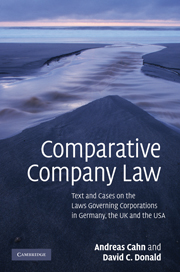 Comparative Company Law
Comparative Company Law Book contents
- Frontmatter
- Contents
- List of figures
- List of tables
- Preface and acknowledgments
- Glossary
- List of abbreviations
- Table of cases
- Table of legislation
- PART I The essential qualities of the corporation
- PART II The corporation and its capital
- 4 Incorporating the company
- 5 Constituting the company's share capital
- 6 Increasing the company's capital
- 7 Distribution of dividends and maintenance of share capital
- 8 Repurchases of shares
- 9 The nature of shares and classes of shares
- PART III Governing the corporation
- PART IV Corporate combinations, groups and takeovers
- References
- Index
9 - The nature of shares and classes of shares
from PART II - The corporation and its capital
- Frontmatter
- Contents
- List of figures
- List of tables
- Preface and acknowledgments
- Glossary
- List of abbreviations
- Table of cases
- Table of legislation
- PART I The essential qualities of the corporation
- PART II The corporation and its capital
- 4 Incorporating the company
- 5 Constituting the company's share capital
- 6 Increasing the company's capital
- 7 Distribution of dividends and maintenance of share capital
- 8 Repurchases of shares
- 9 The nature of shares and classes of shares
- PART III Governing the corporation
- PART IV Corporate combinations, groups and takeovers
- References
- Index
Summary
Required reading
D: AktG, §§ 11, 23(2), 139–141, 179(3), 182(2), 202(2), 221 sentence 4, 222(2)
UK: CA 2006, secs. 629–640
US: DGCL, §§ 102(b)(3), 151, 221; Model Act, §§ 1.40(13A), (22), 6.01, 6.02, 6.30
The types of rights embodied in shares
Investor ownership is an essential characteristic of the stock corporation. The investing members own the corporation through securities called “shares” (Aktien). As we see from the topics covered in this text, much of company law has to do with the exercise of rights embodied in these “shares.” In this chapter, we will take a closer look at shares and the rights they embody, but, instead of focusing on the exercise and protection of these rights under company law, we will look at their origin in the share of stock and how the rights can be arranged differently in different classes of shares. The type of interest embodied in shares is a property interest, so we will begin with the basic nature of this interest in relation to the company and its assets.
Shareholders own the corporation, not its assets
Nobel laureate Milton Friedman was once chided for referring to shareholders as the “owners” of corporations, and his critic explained: “A lawyer would know that the shareholders do not, in fact, own the corporation. Rather, they own a type of corporate security commonly called ‘stock.’ As owners of stock, shareholders' rights are quite limited. For example, stockholders do not have the right to exercise control over the corporation's assets.”
- Type
- Chapter
- Information
- Comparative Company LawText and Cases on the Laws Governing Corporations in Germany, the UK and the USA, pp. 259 - 294Publisher: Cambridge University PressPrint publication year: 2010


